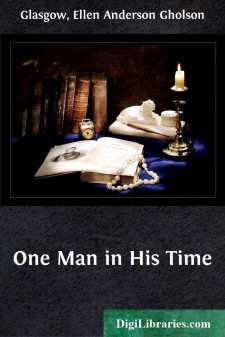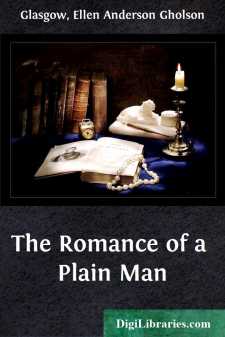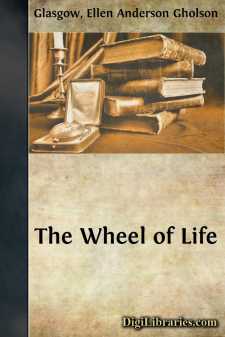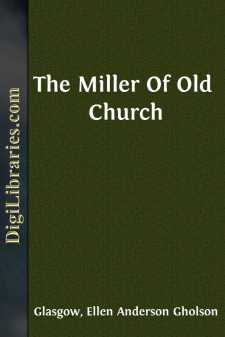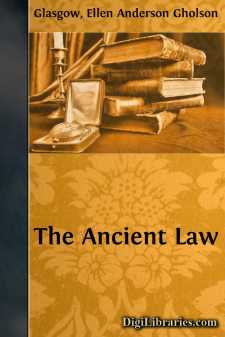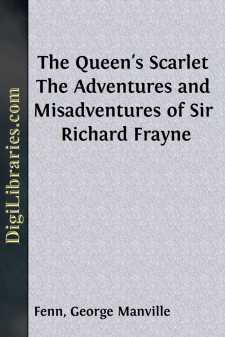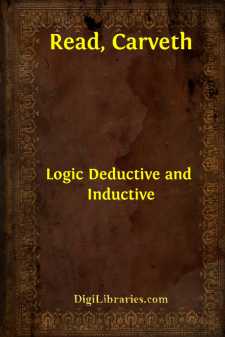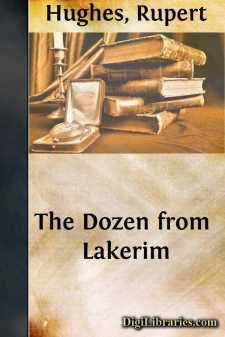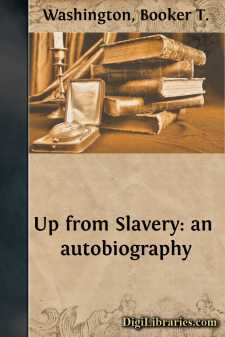Categories
- Antiques & Collectibles 13
- Architecture 36
- Art 47
- Bibles 22
- Biography & Autobiography 811
- Body, Mind & Spirit 110
- Business & Economics 26
- Computers 4
- Cooking 94
- Crafts & Hobbies 3
- Drama 346
- Education 45
- Family & Relationships 50
- Fiction 11812
- Games 19
- Gardening 17
- Health & Fitness 34
- History 1377
- House & Home 1
- Humor 147
- Juvenile Fiction 1873
- Juvenile Nonfiction 202
- Language Arts & Disciplines 88
- Law 16
- Literary Collections 686
- Literary Criticism 179
- Mathematics 13
- Medical 41
- Music 39
- Nature 179
- Non-Classifiable 1768
- Performing Arts 7
- Periodicals 1453
- Philosophy 62
- Photography 2
- Poetry 896
- Political Science 203
- Psychology 42
- Reference 154
- Religion 488
- Science 126
- Self-Help 61
- Social Science 80
- Sports & Recreation 34
- Study Aids 3
- Technology & Engineering 59
- Transportation 23
- Travel 463
- True Crime 29
Virginia
Description:
Excerpt
CHAPTER I
THE SYSTEM
Toward the close of a May afternoon in the year 1884, Miss Priscilla Batte, having learned by heart the lesson in physical geography she would teach her senior class on the morrow, stood feeding her canary on the little square porch of the Dinwiddie Academy for Young Ladies. The day had been hot, and the fitful wind, which had risen in the direction of the river, was just beginning to blow in soft gusts under the old mulberry trees in the street, and to scatter the loosened petals of syringa blossoms in a flowery snow over the grass. For a moment Miss Priscilla turned her flushed face to the scented air, while her eyes rested lovingly on the narrow walk, edged with pointed bricks and bordered by cowslips and wallflowers, which led through the short garden to the three stone steps and the tall iron gate. She was a shapeless yet majestic woman of some fifty years, with a large mottled face in which a steadfast expression of gentle obstinacy appeared to underly the more evanescent ripples of thought or of emotion. Her severe black silk gown, to which she had just changed from her morning dress of alpaca, was softened under her full double chin by a knot of lace and a cameo brooch bearing the helmeted profile of Pallas Athene. On her head she wore a three-cornered cap trimmed with a ruching of organdie, and beneath it her thin gray hair still showed a gleam of faded yellow in the sunlight. She had never been handsome, but her prodigious size had endowed her with an impressiveness which had passed in her youth, and among an indulgent people, for beauty. Only in the last few years had her fleshiness, due to rich food which she could not resist and to lack of exercise for which she had an instinctive aversion, begun seriously to inconvenience her.
Beyond the wire cage, in which the canary spent his involuntarily celibate life, an ancient microphylla rose-bush, with a single imperfect bud blooming ahead of summer amid its glossy foliage, clambered over a green lattice to the gabled pediment of the porch, while the delicate shadows of the leaves rippled like lace-work on the gravel below. In the miniature garden, where the small spring blossoms strayed from the prim beds into the long feathery grasses, there were syringa bushes, a little overblown; crape-myrtles not yet in bud; a holly tree veiled in bright green near the iron fence; a flowering almond shrub in late bloom against the shaded side of the house; and where a west wing put out on the left, a bower of red and white roses was steeped now in the faint sunshine. At the foot of the three steps ran the sunken moss-edged bricks of High Street, and across High Street there floated, like wind-blown flowers, the figures of Susan Treadwell and Virginia Pendleton.
Opening the rusty gate, the two girls tripped with carefully held flounces up the stone steps and between the cowslips and wallflowers that bordered the walk. Their white lawn dresses were made with the close-fitting sleeves and the narrow waists of the period, and their elaborately draped overskirts were looped on the left with graduated bows of light blue ottoman ribbon. They wore no hats, and Virginia, who was the shorter of the two, had fastened a Jacqueminot rose in the thick dark braid which was wound in a wreath about her head. Above her arched black eyebrows, which lent an expression of surprise and animation to her vivid oval face, her hair was parted, after an earlier fashion, under its plaited crown, and allowed to break in a mist of little curls over her temples. Even in repose there was a joyousness in her look which seemed less the effect of an inward gaiety of mind than of some happy outward accident of form and colour. Her eyes, very far apart and set in black lashes, were of a deep soft blue—the blue of wild hyacinths after rain. By her eyes, and by an old-world charm of personality which she exhaled like a perfume, it was easy to discern that she embodied the feminine ideal of the ages. To look at her was to think inevitably of love. For that end, obedient to the powers of Life, the centuries had formed and coloured her, as they had formed and coloured the wild rose with its whorl of delicate petals. The air of a spoiled beauty which rested not ungracefully upon her was sweetened by her expression of natural simplicity and goodness.
For an instant she stood listening in silence to the querulous pipes of the bird and the earnest exhortations of the teacher on the joys of cage life for both bird and lady. Then plucking the solitary early bud from the microphylla rose-bush, she tossed it over the railing of the porch on the large and placid bosom of Miss Priscilla.
"Do leave Dicky alone for a minute!" she called in a winning soprano voice.
At the sound, Miss Priscilla dropped the bit of cake she held, and turned to lean delightedly over the walk, while her face beamed like a beneficent moon through the shining cloud of rose-leaves.
"Why, Jinny, I hadn't any idea that you and Susan were there!"
Her smile included Virginia's companion, a tall, rather heavy girl, with intelligent grey eyes and fair hair cut in a straight fringe across her forehead. She was the daughter of Cyrus Treadwell, the wealthiest and therefore the most prominent citizen of the town, and she was also as intellectual as the early eighties and the twenty-one thousand inhabitants of Dinwiddie permitted a woman to be. Her friendship for Virginia had been one of those swift and absorbing emotions which come to women in their school-days. The stronger of the two, she dominated the other, as she dominated every person or situation in life, not by charm, but by the force of an energetic and capable mind. Though her dress matched Virginia's in every detail, from the soft folds of tulle at the neck to the fancy striped stockings under the bouffant draperies, the different shapes of the wearers gave to the one gown an air of decorous composure and to the other a quaint and appealing grace. Flushed, ardent, expectant, both girls stood now at the beginning of womanhood. Life was theirs; it belonged to them, this veiled, radiant thing that was approaching. Nothing wonderful had come as yet—but to-morrow, the day after, or next year, the miracle would happen, and everything would be different! Experience floated in a luminous mystery before them. The unknown, which had borrowed the sweetness and the colour of their illusions, possessed them like a secret ecstasy and shone, in spite of their shyness, in their startled and joyous look.
"Father asked me to take a message over to General Goode," explained Virginia, with a little laugh as gay as the song of a bird, "but I couldn't go by without thanking you for the cherry bounce. I made mother drink some of it before dinner, and it almost gave her an appetite."
"I knew it was what she needed," answered Miss Priscilla, showing her pleasure by an increasing beam. "It was made right here in the house, and there's nothing better in the world, my poor mother used to say, to keep you from running down in the spring. But why can't you and Susan come in and sit a while?"
"We'll be straight back in a minute," replied Susan before Virginia could answer. "I've got a piece of news I want to tell you before any one else does. Oliver came home last night."
"Oliver?" repeated Miss Priscilla, a little perplexed. "You don't mean the son of your uncle Henry, who went out to Australia? I thought your father had washed his hands of him because he had started play-acting or something?" Curiosity, that devouring passion of the middle-aged, worked in her breast, and her placid face grew almost intense in expression.
"Yes, that's the one," replied Susan. "They went to Australia when Oliver was ten years old, and he's now twenty-two. He lost both his parents about three years ago," she added.
"I know. His mother was my cousin," returned Miss Priscilla. "I lost sight of her after she left Dinwiddie, but somebody was telling me the other day that Henry's investments all turned out badly and they came down to real poverty. Sarah Jane was a pretty girl and I was always very fond of her, but she was one of the improvident sort that couldn't make two ends meet without tying them into a bow-knot."
"Then Oliver must be just like her. After his mother's death he went to Germany to study, and he gave away the little money he had to some student he found starving there in a garret."
"That was generous," commented Miss Priscilla thoughtfully, "but I should hardly call it sensible. I hope some day, Jinny, that your father will tell us in a sermon whether there is biblical sanction for immoderate generosity or not."
"But what does he say?" asked Virginia softly, meaning not the rector, but the immoderate young man.
"Oh, Oliver says that there wasn't enough for both and that the other student is worth more to the world than he is," answered Susan. "Then, of course, when he got so poor that he had to pawn his clothes or starve, he wrote father an almost condescending letter and said that as much as he hated business, he supposed he'd have to come back and go to work. 'Only,' he added, 'for God's sake, don't make it tobacco!' Wasn't that dreadful?"
"It was extremely impertinent," replied Miss Priscilla sternly, "and to Cyrus of all persons! I am surprised that he allowed him to come into the house."
"Oh, father doesn't take any of his talk seriously. He calls it 'starvation foolishness,' and says that Oliver will get over it as soon as he has a nice little bank account. Perhaps he will—he is only twenty-two, you know—but just now his head is full of all kinds of new ideas he picked up somewhere abroad. He's as clever as he can be, there's no doubt of that, and he'd be really good-looking, too, if he didn't have the crooked nose of the Treadwells. Virginia has seen him only once in the street, but she's more than half in love with him already."
"Do come, Susan!" remonstrated Virginia, blushing as red as the rose in her hair. "It's past six o'clock and the General will have gone if we don't hurry." And turning away from the porch, she ran between the flowering syringa bushes down the path to the gate.
Having lost his bit of cake, the bird began to pipe shrilly, while Miss Priscilla drew a straight wicker chair (she never used rockers) beside the cage, and, stretching out her feet in their large cloth shoes with elastic sides, counted the stitches in an afghan she was knitting in narrow blue and orange strips. In front of her, the street trailed between cool, dim houses which were filled with quiet, and from the hall at her back there came a whispering sound as the breeze moved like a ghostly footstep through an alcove window. With that strange power of reflecting the variable moods of humanity which one sometimes finds in inanimate objects, the face of the old house had borrowed from the face of its mistress the look of cheerful fortitude with which her generation had survived the agony of defeat and the humiliation of reconstruction. After nineteen years, the Academy still bore the scars of war on its battered front. Once it had watched the spectre of famine stalk over the grass-grown pavement, and had heard the rattle of musketry and the roar of cannon borne on the southern breeze that now wafted the sounds of the saw and the hammer from an adjacent street. Once it had seen the flight of refugees, the overflow of the wounded from hospitals and churches, the panic of liberated slaves, the steady conquering march of the army of invasion. And though it would never have occurred to Miss Priscilla that either she or her house had borne any relation to history (which she regarded strictly as a branch of study and visualized as a list of dates or as a king wearing his crown), she had, in fact, played a modest yet effective part in the rapidly changing civilization of her age. But events were powerless against the genial heroism in which she was armoured, and it was characteristic of her, as well as of her race, that, while she sat now in the midst of encircling battlefields, with her eyes on the walk over which she had seen the blood of the wounded drip when they were lifted into her door, she should be brooding not over the tremendous tragedies through which she had passed, but over the lesson in physical geography she must teach in the morning. Her lips moved gently, and a listener, had there been one, might have heard her murmur: "The four great alluvial plains of Asia—those of China and of the Amoo Daria in temperate regions; of the Euphrates and Tigris in the warm temperate; of the Indus and Ganges under the Tropic—with the Nile valley in Africa, were the theatres of the most ancient civilizations known to history or tradition——"
As she ended, a sigh escaped her, for the instruction of the young was for her a matter not of choice, but of necessity. With the majority of maiden ladies left destitute in Dinwiddie after the war, she had turned naturally to teaching as the only nice and respectable occupation which required neither preparation of mind nor considerable outlay of money. The fact that she was the single surviving child of a gallant Confederate general, who, having distinguished himself and his descendants, fell at last in the Battle of Gettysburg, was sufficient recommendation of her abilities in the eyes of her fellow citizens. Had she chosen to paint portraits or to write poems, they would have rallied quite as loyally to her support. Few, indeed, were the girls born in Dinwiddie since the war who had not learned reading, penmanship ("up to the right, down to the left, my dear"), geography, history, arithmetic, deportment, and the fine arts, in the Academy for Young Ladies. The brilliant military record of the General still shed a legendary lustre upon the school, and it was earnestly believed that no girl, after leaving there with a diploma for good conduct, could possibly go wrong or become eccentric in her later years. To be sure, she might remain a trifle weak in her spelling (Miss Priscilla having, as she confessed, a poor head for that branch of study), but, after all, as the rector had once remarked, good spelling was by no means a necessary accomplishment for a lady; and, for the rest, it was certain that the moral education of a pupil of the Academy would be firmly rooted in such fundamental verities as the superiority of man and the aristocratic supremacy of the Episcopal Church. From charming Sally Goode, now married to Tom Peachey, known familiarly as "honest Tom," the editor of the Dinwiddie Bee, to lovely Virginia Pendleton, the mark of Miss Priscilla was ineffaceably impressed upon the daughters of the leading families.
Remembering this now, as she was disposed to do whenever she was knitting without company, Miss Priscilla dropped her long wooden needles in her lap, and leaning forward in her chair, gazed out upon the town with an expression of child-like confidence, of touching innocence. This innocence, which belonged to the very essence of her soul, had survived both the fugitive joys and the brutal disillusionments of life. Experience could not shatter it, for it was the product of a courage that feared nothing except opinions. Just as the town had battled for a principle without understanding it, so she was capable of dying for an idea, but not of conceiving one. She had suffered everything from the war except the necessity of thinking independently about it, and, though in later years memory had become so sacred to her that she rarely indulged in it, she still clung passionately to the habits of her ancestors under the impression that she was clinging to their ideals. Little things filled her days—the trivial details of the classroom and of the market, the small domestic disturbances of her neighbours, the moral or mental delinquencies of her two coloured servants—and even her religious veneration for the Episcopal Church had crystallized at last into a worship of customs.
To-day, at the beginning of the industrial awakening of the South, she (who was but the embodied spirit of her race) stood firmly rooted in all that was static, in all that was obsolete and outgrown in the Virginia of the eighties. Though she felt as yet merely the vague uneasiness with which her mind recoiled from the first stirrings of change, she was beginning dimly to realize that the car of progress would move through the quiet streets before the decade was over. The smoke of factories was already succeeding the smoke of the battlefields, and out of the ashes of a vanquished idealism the spirit of commercial materialism was born. What was left of the old was fighting valiantly, but hopelessly, against what had come of the new. The two forces filled the streets of Dinwiddie. They were embodied in classes, in individuals, in articles of faith, in ideals of manners. The symbol of the one spirit was the memorial wreaths on the battlefields; of the other it was the prophetic smoke of the factories. From where she stood in High Street, she could see this incense to Mammon rising above the spires of the churches, above the houses and the hovels, above the charm and the provincialism which made the Dinwiddie of the eighties. And this charm, as well as this provincialism, appeared to her to be so inalienable a part of the old order, with its intrepid faith in itself, with its militant enthusiasm, with its courageous battle against industrial evolution, with its strength, its narrowness, its nobility, its blindness, that, looking ahead, she could discern only the arid stretch of a civilization from which the last remnant of beauty was banished forever. Already she felt the breaking of those bonds of sympathy which had held the twenty-one thousand inhabitants of Dinwiddie, as they had held the entire South, solidly knit together in a passive yet effectual resistance to the spirit of change. Of the world beyond the borders of Virginia, Dinwiddians knew merely that it was either Yankee or foreign, and therefore to be pitied or condemned according to the Evangelical or the Calvinistic convictions of the observer. Philosophy, they regarded with the distrust of a people whose notable achievements have not been in the direction of the contemplative virtues; and having lived comfortably and created a civilization without the aid of science, they could afford not unreasonably to despise it. It was a quarter of a century since "The Origin of Species" had changed the course of the world's thought, yet it had never reached them. To be sure, there was an old gentleman in Tabb Street whose title, "the professor," had been conferred in public recognition of peaceful pursuits; but since he never went to church, his learning was chiefly effective when used to point a moral from the pulpit. There was, also, a tradition that General Goode had been seen reading Plato before the Battle of Seven Pines; and this picturesque incident had contributed the distinction of the scholar to the more effulgent glory of the soldier. But for purely abstract thought—for the thought that did not construct an heroic attitude or a concrete image—there was as little room in the newer industrial system as there had been in the aristocratic society which preceded it. The world still clung to the belief that the business of humanity was confined to the preservation of the institutions which existed in the present moment of history—and Dinwiddie was only a quiet backwater into which opinions, like fashions, were borne on the current of some tributary stream of thought. Human nature in this town of twenty-one thousand inhabitants differed from human nature in London or in the Desert






